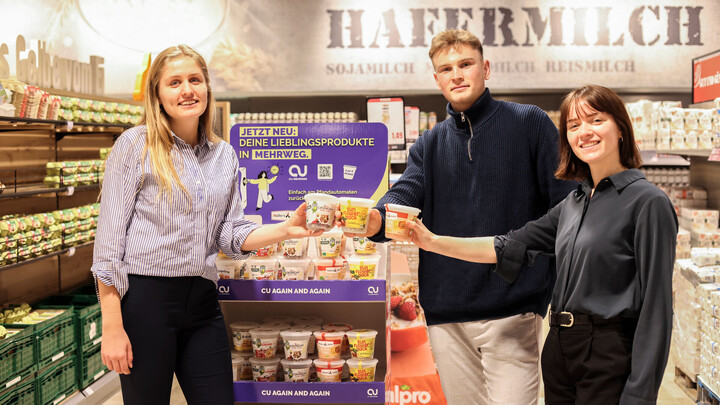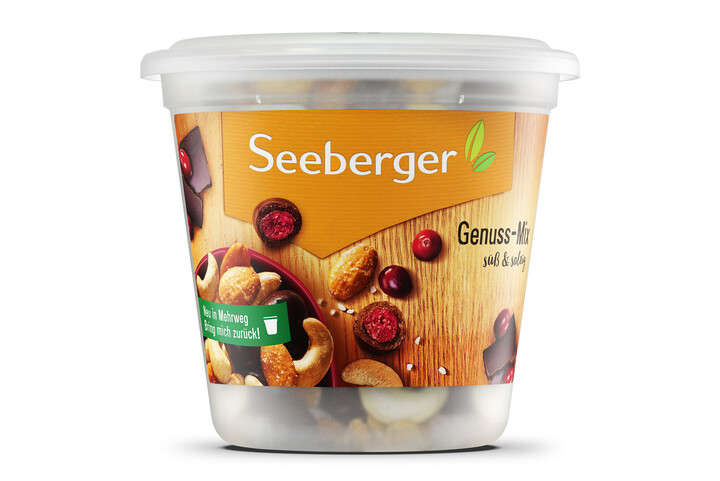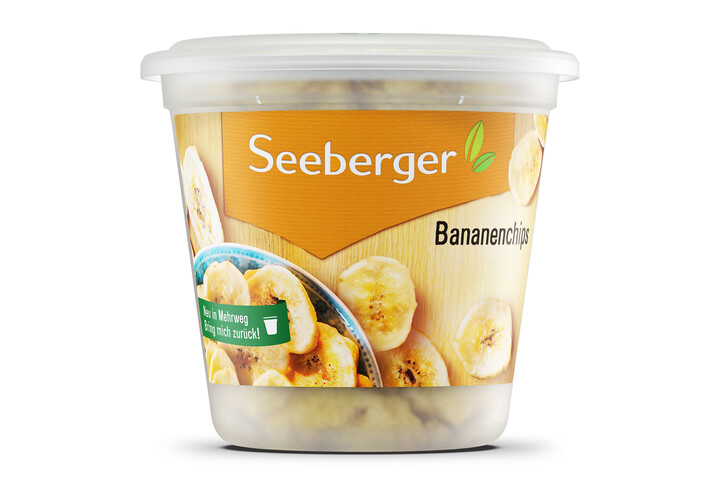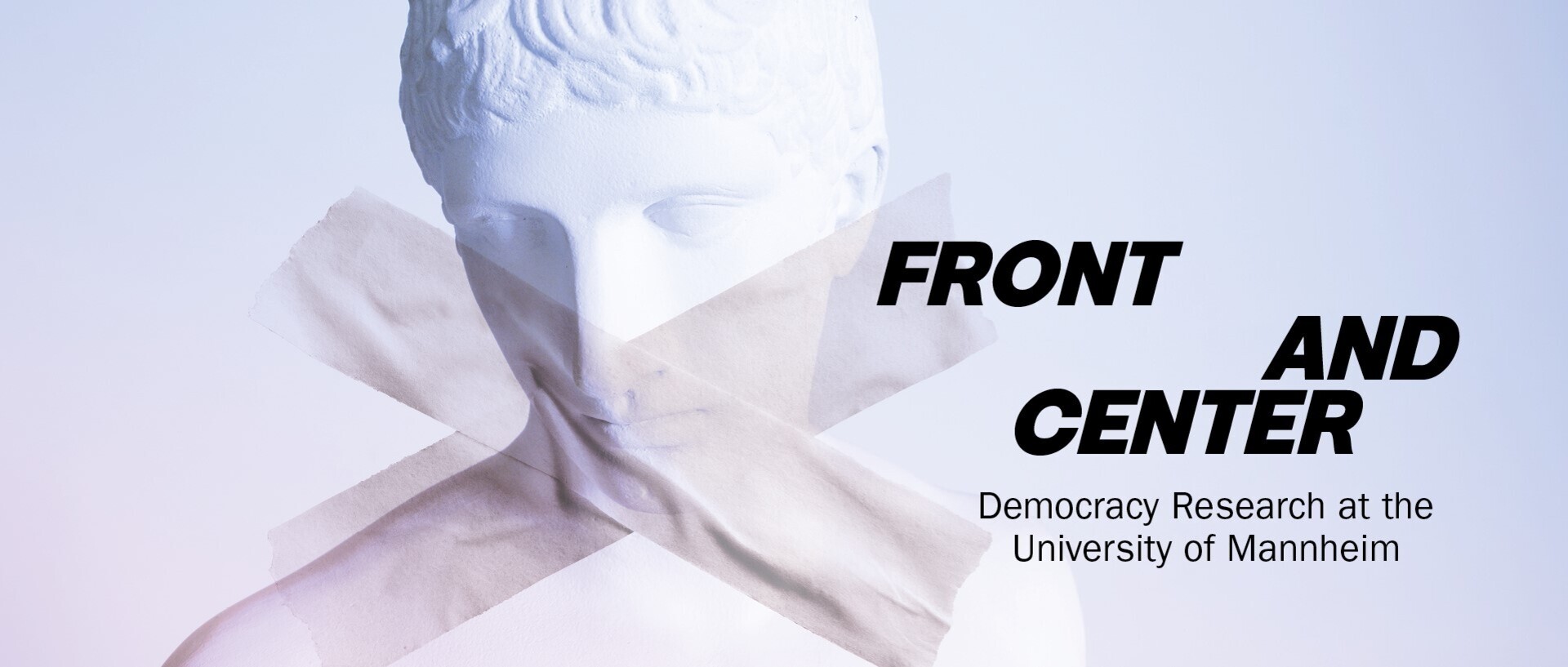The comeback containers
CU Mehrweg is a startup co-founded by University of Mannheim alumnae Tatiana Tsarkova and Mette-Maria Meyer. Their idea is as simple as it is brilliant: package foods like nuts, dried fruit, or gummy bears in reusable containers that can be returned via a deposit machine and recycled.

It’s a bustling morning in Mannheim’s G7 district. Women are arriving on foot or by bike, crossing a leafy courtyard and heading toward the rear building. Behind the sleek glass doors is GIG7—Kompetenzzentrum FeMale Business, which is hosting a workshop for women interested in launching their own companies. Among the crowd are two women who’ve already taken the plunge: CU Mehrweg co-founders Tatiana Tsarkova and Mette-Maria Meyer.
They’ve rented office space here at the business center, but with the sun shining and the courtyard quieter than inside, they opt to sit outdoors for our interview. Meyer dashes back inside and returns moments later, laughing and carrying a tall stack of containers. “This is it—our product!” she says, proudly placing the stack on the table.
The product is a compact cup with a lid, containing 200 grams of Seeberger’s sweet & salty snack mix: dried cranberries in dark chocolate, roasted cashews, salted almonds—delicious! The lid reads: “open – snack – return to a deposit machine!”—a slogan that captures CU Mehrweg’s clever concept. These Seeberger snack boxes are currently being piloted in 18 selected REWE Südwest supermarkets. The pilot program runs for three months, with a 50-cent deposit on each container.

A startup with a purpose
Tsarkova explains what happens next: “We clean the containers and send them back to the food producers to be refilled. Every reuse cycle saves valuable resources.” For a young startup such as CU Mehrweg, this major pilot project involving REWE and EDEKA is a milestone—and one Tsarkova admits she wouldn’t have thought possible four years ago.
Back then, she was a member of Enactus, a student organization at the University of Mannheim dedicated to tackling global social and environmental problems through innovative projects. In the middle of the pandemic lockdown, she took part in a national competition challenging participants to develop a reusable packaging system for food. Her team won first place—and kept working on the idea, even after the contest ended. “I believed so strongly in what we’d developed that I eventually decided to go all in and found a company,” says Tsarkova, recalling those early days.

That meant applying for grants, launching smaller pilots—and squeezing in her Business Administration and Cultural Studies degree along the way. Oh, and recruiting co-founders! “From the start, I knew that building a startup like this would require a great team—one that’s truly committed for the long haul,” she says. Through a mix of coincidence and networking, she brought on Mette-Maria Meyer, and later Jonathan Schröder. Together, the trio has made big strides, attracting major clients such as Seeberger, Müller’s Mühle, Bohlsener Mühle, and Sunflower Family.
Looking back, Meyer says the journey has been “a little bit crazy.” She and Tsarkova faced some serious dry spells—at one point, Meyer even applied for a part-time job at a supermarket because the future of the project seemed uncertain. “But they didn’t hire me,” she says, laughing.
Originally from Hamburg, Meyer now considers CU Mehrweg her “baby.” A key moment for her came during her onboarding session, when Tsarkova showed her a documentary about Germany’s recycling system. “It turns out that the recycling rate of all the waste we put into our yellow bins is super small. Only 11.5 percent of the packaging from the yellow bins actually gets recycled into new packaging. The rest is burned or exported. We all think we’re doing a great job sorting our waste properly and helping the environment—but that’s just not true.”

Aiming for a circular economy
With product development and strategic partnerships now in place, CU Mehrweg is entering its next growth phase: building out the team. While Tsarkova and Meyer are sharing their story in the courtyard, co-founder Schröder is inside training the company’s first full-time hire. The team has no plans to slow down. Tsarkova puts their goal plainly: “There are already some great zero-waste stores and reusable coffee cups. But the big challenge is making the entire grocery retail sector circular. We don’t want to stop at dry foods—eventually, this could apply to everything. Our goal is to make reusable packaging the standard in mainstream food retail.”
Text: Jule Leger / August 2025
